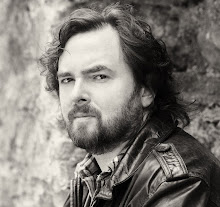A Busy Week: Interviews, Debates, Readings, Signings, Meetings and Tours
Monday, August 03, 2009, 10:19 PM
At various dinners, office tours and visits to the pub, I met, amongst others, my editor Geoff Mulligan, my other editor Briony Everroad, Harvill Secker publishing director Liz Foley, my UK agent Caspian Dennis, my lovely and very patient publicist Kate Bland, and marketing director Roger Bratchell, as well as a host of other marketing, editorial and sales people far too numerous to mention. Suffice it to say that I was met with hospitality and warmth wherever I went.
I learned more about the publishing business over these three or four days than I have done in two or three years of following all the agent and editor blogs out there. Don't get me wrong - I still believe the wealth of information out there on the Internet is a key factor in my getting as far as I have. But actually meeting the people who are working on my book, finding out how they deal with the press and the retailers, how hard they have to strive to get me out there on the shelves and into the reviews - well, I have a whole new respect for what they do, and a whole lot more gratitude.
I'm a good example of a little knowledge being a dangerous thing, and I have gone into publication expecting a fight. All those blogs out there tell us writers we have to be ready to push and push, and as a result, those of us lucky enough to make it over the transom might wind up on a strange combination of the offensive and the defensive. For example, and I shall confess a big lump of naivety here, after the brilliant review I received in The Observer, I felt a little let down when it wasn't immediately followed by a plethora of reviews in other publications. It wasn't until I met the good people at my publisher that I realised those reviews have to be fought tooth and nail for, that there are dozens and dozens of books duking it out for those precious column inches. Then I realised how incredibly fortunate I've been to get the reviews I've had; there are any number of authors who would gladly give a significant body part to get in depth reviews in both The Observer AND The Guardian. And I also now know how very lucky I am to have gotten so much shelf space in the chain stores, like Eason's and Waterstone's, not to mention the fabulous placement I've had in the airport branches of WH Smith's.
Another valuable lesson has been having realistic expectations in terms of sales for a debut trade paperback. I am told my sell-in is fantastic, enough to make many more established authors envious, and the sell-through is very good from early indications. But something I didn't know, and this may be UK specific and/or particular to the thriller/crime genre, but next year's mass market paperback release is where the real show is. This is where the publisher wants the sales, the hard numbers, and consequently this is where the marketing budget is focused.
Anyway, some photos:

(l-r) Geoff Mulligan (editor at large), Yours Truly, Liz Foley (HS publishing director), Caspian Dennis (my UK agent), Briony Everroad (editor)
And here is my publicist Kate Bland outside Foleys bookshop on Charing Cross Road, where she took me to sign books:

And finally, in this particulr branch of WH Smith's at Stansted Airport, I was #1! I was #15 in a couple of others, but let's just focus on this particular branch, shall we?:

One of the big surprises of the trip came when I went to the offices of the Abner Stein agency in Kensington to meet my UK co-agent Caspian Dennis. I had no earthly idea who else this agency represented, and my jaw must have made quite a noise when it hit the floor upon seeing some of the names. I won't mention them, but we're talking the biggest of the biggest of the big among contemporary authors, as in none more big, like mastadons of modern novelists. I am in quite extraordinary company there.
And finally...
There were a couple of interesting radio bits and pieces recently, and I have saved the audio for anyone interested. The first is the aforementioned BBC World Service interview, which can be listened to here at this link, complete with sound effects during the reading.
The second, and most interesting, was a debate that aired on BBC Radio Ulster just over a week ago on the Sunday Sequence programme, in which the presenter Robbie Meredith discussed the ethics and politics of The Twelve with journalists and authors Henry McDonald and Ruth Dudley Edwards. It's about ten minutes long, and well worth listening to by clicking here.
Labels: harvill secker, henry mcdonald, interview, publishing, radio, ruth dudley edwards











